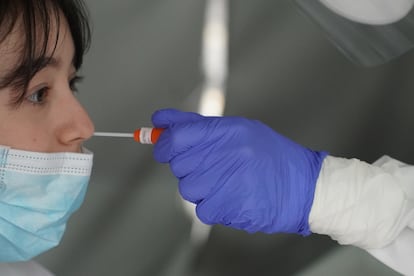Number of coronavirus cases in Spain doubles in 24 hours, but weekly trend remains stable
Health officials also warned of the risk of imported infections, reporting 96 since May 11

The Spanish Health Ministry reported on Wednesday that the number of new coronavirus cases had doubled in the previous 24 hours, reaching 167 infections. This is up from Tuesday’s figure of 84, which was also nearly double the number from the day before. An uptick in cases, however, has come to be expected on Tuesdays due to underreporting over the weekends.
Although Spain saw a rise in the number of new daily infections, the weekly trend remained stable. For the past several days, this figure has remained at around 2,000 cases.
The Health Ministry has not yet updated the official total number of coronavirus victims, which remained at 27,136 on Wednesday for the fourth day running. Health authorities have changed the way they present the total number of victims, so that only fatalities that occurred the day before are added to the death toll. For the past 15 days, fatalities that took place at an earlier date, but were only recently reported to the Health Ministry, have not been included in the official count.
We are detecting small controlled and localized outbreaks that could lead to a rise in community transmissionFernando Simón, director of the Health Ministry’s Coordination Center for Health Alerts
According to the latest figures, 40 coronavirus-related deaths were reported in the last week. Fernando Simón, the director of the Health Ministry’s Coordination Center for Health Alerts, said on Wednesday that the number of daily fatalities had dropped significantly since May 11, when the new reporting system was introduced. While before Spain had reported between 95 and 100 daily deaths, in recent days this number had fallen to between two and five, explained Simón at a government press conference.
A total of 235 patients began experiencing coronavirus symptoms in the last seven days, a slight rise from the figure reported in previous days. More than half of these cases are concentrated in the regions of Madrid and Catalonia. All of Spain’s 17 regions, with the exception of Madrid and Navarre, reported less than one case per 100,000 inhabitants in Wednesday’s report. Only the North African exclave cities of Ceuta and Melilla did not report a single infection.
Simón warned on Wednesday that Spain must remain on guard to prevent a spike in new cases. “We are detecting small controlled and localized outbreaks that could lead to a rise in community transmission if the [infected] people and their contacts do not go into quarantine,” he said. The health official pointed to the example of Portugal, which has had a significantly lower incidence of the virus than Spain, but reported 421 new cases on Tuesday.
In the last week, 137 coronavirus patients were hospitalized, 12 of whom required intensive care. These intensive care admissions were concentrated in six regions: Aragón, Cantabria, Castilla-La Mancha, Castilla y León, Catalonia and Madrid.
Risk of imported cases
Simón also warned about the risk of imported cases, in other words people who were infected in another country and who traveled to Spain carrying the virus. Since May 11, Spain has recorded 96 imported cases, 24 of which were detected just between June 3 and 9. These cases come from high-risk areas such as the Americas, the Arabian peninsula, Southeast Asia and northern Europe. “Every region has to make a significant effort when it comes to controlling and detecting cases in travelers and possible contacts,” said Simón.
The risk of imported cases is likely to grow as Spain prepares to reopen to international tourists. More than 10,000 visitors from Germany will be allowed to visit the Balearic Islands from June 15, and the central government is discussing a similar pilot scheme with the Canary Islands.
Spain will officially welcome international tourists from July 1, when the compulsory 14-day quarantine for visitors will come to an end.
English version by Melissa Kitson.
Tu suscripción se está usando en otro dispositivo
¿Quieres añadir otro usuario a tu suscripción?
Si continúas leyendo en este dispositivo, no se podrá leer en el otro.
FlechaTu suscripción se está usando en otro dispositivo y solo puedes acceder a EL PAÍS desde un dispositivo a la vez.
Si quieres compartir tu cuenta, cambia tu suscripción a la modalidad Premium, así podrás añadir otro usuario. Cada uno accederá con su propia cuenta de email, lo que os permitirá personalizar vuestra experiencia en EL PAÍS.
¿Tienes una suscripción de empresa? Accede aquí para contratar más cuentas.
En el caso de no saber quién está usando tu cuenta, te recomendamos cambiar tu contraseña aquí.
Si decides continuar compartiendo tu cuenta, este mensaje se mostrará en tu dispositivo y en el de la otra persona que está usando tu cuenta de forma indefinida, afectando a tu experiencia de lectura. Puedes consultar aquí los términos y condiciones de la suscripción digital.








































